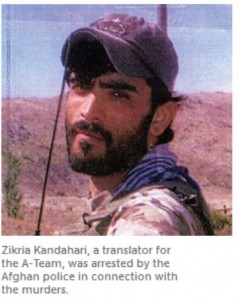Aikins in Rolling Stone: Zakaria Kandahari Was in Facebook Contact With Special Forces After Escaping Arrest
By now, you undoubtedly have heard about Matthieu Aikins’ blockbuster story published yesterday by Rolling Stone, in which he provides a full description of war crimes carried out by Special Operations forces in the Nerkh District of Maidan Wardan province, Afghanistan. [If not, go read it in full, now!] I began following this story closely back in February when Hamid Karzai demanded the removal of all Special Operations forces from Maidan Wardak because of the crimes committed by this group. As more details of the crimes slowly emerged after that time, it became more and more clear that although several members of the US Special Operations A-Team participated in the crimes, a translator working for them, going by the name of Zakaria Kandahari, was central to the worst of the events. It eventually emerged that Karzai had demanded in January that the US hand Kandahari over for questioning, but the US eventually claimed that Kandahari had escaped. I had viewed that claim with extreme skepticism. Details provided by Aikins at the very end of his article provide justification for that skepticism, as it turns out that while Kandahari was “missing”, he appears to have used Facebook to stay in contact with the Special Operations team of which he had been a part.
Back in May, the New York Times carried an article detailing some of the charges against Kandahari and providing a description of his disappearance. Note especially the military’s multiple claims that they had nothing to do with the disappearance and did not know where he was:
Afghan officials investigated the events in the Nerkh district, and when they concluded that the accusations of misconduct by the team were true, the head of the Afghan military, Gen. Sher Mohammad Karimi, personally asked the American commander at the time, Gen. John R. Allen, to hand Mr. Kandahari over to the Afghan authorities.
According to a senior Afghan official, General Allen personally promised General Karimi that the American military would do so within 24 hours, but the promise was not kept, nor was a second promise a day later to hand him over the following morning. “The next morning they said he had escaped from them and they did not know where he was,” the official said.
The American official said the military was not trying to shield Mr. Kandahari. “The S.F. guys tried to pick him up, but he got wind of it and went on the lam, and we lost contact with him,” the official said. “We would have no reason to try to harbor this individual.”
And a spokesman for the American military, David E. Nevers, said General Allen “never had a conversation with General Karimi about this issue.”
That “we lost contact with him” is just one of the many lies put out by the military about this entire series of events. Look at what Aikins uncovered, just by finding Facebook traffic from the A-Team involved (but note that this moves Kandahari’s disappearance back to December from the previous accounts that put it in January): Read more →

